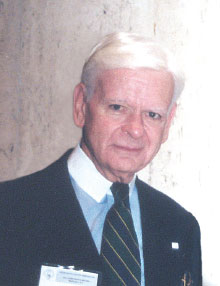Robert Campbell, M.D., Towering Figure in 20th Century Psychiatry, Dies
Abstract
Campbell was involved in some of the most important developments in 20th century American psychiatry, including the removal of homosexuality from DSM.

Psychiatrist Robert Campbell, M.D., died last month. He was 94.
Long-time APA member and leader Robert Campbell, M.D., died last month in New York City. He was 94 years old.
The extent of Campbell’s involvement with APA and his influence on psychiatry as an administrator, educator, clinician, editor, and publisher is extraordinary. He was speaker of the APA Assembly (1978-79), vice president of APA (1980-82), and a member of the Board of Trustees (1984-1990). He was also president of the New York County Psychiatric Society (1975-1976).
As a member of the APA Task Force on Nomenclature and Statistics from 1969 to 1975, he was instrumental in efforts that led to the removal of homosexuality from DSM in 1973.
Campbell was also a member of the Joint Commission on Government Relations from 1973-1990, and chair of the commission from 1975-1980. He received a Distinguished Service Award in 2002 from the APA Political Action Committee.
Campbell is survived by his partner of more than 50 years, Cesare Santeramo.
“Robert Campbell’s contributions to psychiatry and APA are simply extraordinary,” said APA CEO and Medical Director Saul Levin, M.D., M.P.A. “He was a giant in the field when I was coming up as a resident and early career psychiatrist. He will be sorely missed, and we extend our condolences to Cesare and to his many, many friends and admirers.”
Campbell published over 150 books, chapters, articles, and reviews, including Campbell’s Psychiatric Dictionary, a seminal text he edited since 1956. He was editor-in-chief of Psychiatric News from 1983 to 1998 and editor of The Bulletin, the New York State Psychiatric Association newsletter, from 1982 to 1997.
Campbell was a clinical professor of psychiatry at Cornell University Weill Medical College. He was the medical director at Four Winds Hospital in Katonah, N.Y., from 1973 to 1977 and the medical director of Gracie Square Hospital in New York City from 1977 to 2006. He was director emeritus of Gracie Square from 2006 to 2013.
Prior to working at Four Winds Hospital, Campbell had held a variety of positions at St. Vincent’s Hospital, also in New York City, from 1956 to 1973, including director of the Division of Training and Education, director of psychiatric research, and director of community psychiatry.
An interview with Campbell originally appearing in The Journal of Gay and Lesbian Psychotherapy in 2002 underscores the breadth of Campbell’s involvement in some of the most important developments in American psychiatry in the latter part of the 20th century. (It was later republished in the book American Psychiatry and Homosexuality: An Oral History in 2007.) It also showcases his humor and sometimes bracingly direct way of expressing himself.
Edward Hanin, M.D., also a past speaker of the Assembly and a longtime friend and colleague of Campbell’s, recalled his days as a resident at St. Vincent’s when Campbell was the director of training there. “He was a superb teacher and a brilliant lecturer,” Hanin said. “He was important to APA in so many ways that it’s almost impossible to capture the breadth of his contributions. He earned the respect of everyone he met.”
His friendships were far-flung, Hanin said, including several prominent celebrities, and his interests outside of medicine and psychiatry were vast and deep. An especially ardent fan of the opera and member of the Metropolitan Opera Guild, he was a longtime member of the board of the Ferro International Program for Operatic Scholars and Students.
Campbell received his medical degree in 1948 from the Columbia University College of Physicians and Surgeons and completed his residency at the New York State Psychiatric Institute. ■



